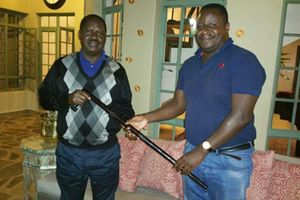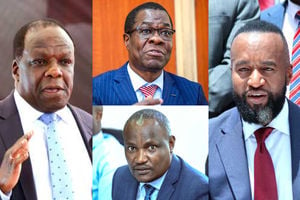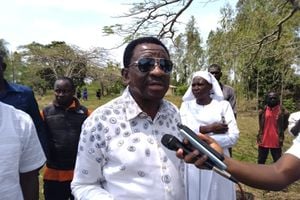
From left: Azimio leader Mwangi wa Iria, Kalonzo Musyoka, Raila Odinga, Uhuru Kenyatta and Eugene Wamalwa during an Interdenominational prayer service for victims of police brutality at SKM Center in Karen on July 28, 2023.
The infighting within the Raila Odinga-led Azimio la Umoja One Kenya Party has cast doubt on the survival of political coalitions in Kenya after elections, dating back to the last days of President Daniel arap Moi’s tenure.
The squabbles in the opposition coalition went a notch higher early this week after a scheduled virtual Council meeting that was expected to be chaired by former President Uhuru Kenyatta aborted after Mr Odinga’s ODM, the principal coalition partner, denied knowledge of it.
Already Narc Kenya Party, led by Mr Odinga’s running mate in the 2022 presidential election Martha Karua, has written to the Registrar of Political Parties on its intention to withdraw from the coalition noting that its continued stay in the outfit was no longer “tenable.”
Mr Odinga’s lieutenants in ODM have also accused some of their main partners in the coalition of disrespecting the former Prime Minister.
The party pointed accusing fingers at Mr Kenyatta’s Jubilee party, Wiper led by Kalonzo Musyoka, Eugene Wamalwa’s DAP-K, Gideon Moi’s Kanu and Peter Munya’s PNU, which have blamed ODM of betraying the coalition by working with President William Ruto’s administration. The storm intensified after key figures in Mr Odinga’s party joined President William Ruto’s broad-based government.
ODM Deputy Party leader Godfrey Osotsi and National Chairperson Gladys Wanga have maintained that the party remains the principal partner in Azimio, adding that no amount of intimidation or blackmail will push them to submission.
“When they tell us we have joined government, on what basis are they speaking because we don’t have any written agreement with Kenya Kwanza? Isn’t this not just mere drama?” Mr Osotsi said.
“We will not allow to be lectured by some of our junior partners that we leave the coalition,” he added.
Ms Wanga emphasised there is no agreement between ODM and Kenya Kwanza that makes the two joint partners in government.
Those who were nominated to the cabinet are; former Deputy Party Leaders Ali Hassan Joho and Wycliffe Oparanya, former National Chairman John Mbadi, former Secretary for Political Affairs Opiyo Wandayi and former member of the party's National Elections Coordinating Committee Ms Beatrice Askul.
But it is the pronouncement by Mr Wamalwa following the aborted Council meeting that has lifted the lid on the impending death of the coalition.
Mr Wamalwa told Nation Africa that individual parties in the coalition will now have to make their own decisions regarding their continued stay in the outfit or chat a way out.
“The parties will now be left to make their own decisions as ODM has, and may the chips fall where they may,” the DAP-K leader said.
The predicament that the coalition finds itself in is however, not new in the country’s political arena, in most instances, with Mr Odinga at the centre of them.
It dates back to more than two decades ago when on March 18, 2002 Mr Odinga through his then National Development Party (NDP) entered into a working arrangement with President Moi’s Kanu through a merger.
At least 6,000 delegates – 4,500 from Kanu and 1,500 from NDP — gathered at Kasarani Sports Centre where they elected new officials with Mr Odinga securing the powerful Secretary General post unopposed.
The creation of four party vice-chairman posts went to Young Turks after the convention elected Kalonzo Musyoka, Musalia Mudavadi, Ronald Ngala and Uhuru Kenyatta.
Then vice president George Saitoti, thought to be the heir apparent, had been forced to withdraw from the race at the tension packed event.
President Moi reiterated his intention to hand over power to the younger generation.
"I have said and I will say again now that I would like to see younger people take over the running of affairs in this country," he asserted.
"As you all know, Kenya is a young nation. Over 81 percent of our population - that is over 24 million Kenyans - are under 35 years of age. Whereas only 19 per cent of the population is over 35 years old," he said then.
True to his words, President Moi would later in the year endorse 41-year-old Mr Kenyatta as his successor, leading to a major revolt in the ruling party with Mr Odinga leading mass defection from Kanu to Liberal Democratic Party (LDP).
Mr Odinga, Mr Saitoti, Mr Musyoka, former vice president Moody Awori were some of the top Kanu leaders who left Kanu to LDP which later joined hands with National Alliance of Kenya (NAK) luminaries led by former president Mwai Kibaki, the late vice president Kijana Wamalwa and Charity Ngilu to form National Alliance Rainbow Coalition (Narc).
Narc, with Mr Kibaki as flag bearer following Mr Odinga’s ‘Kibaki Tosha’ declaration would later beat Mr Kenyatta in the presidential elections in the December 2002 polls.
Mr Kibaki garnered 3,646,277 votes (62.2 per cent) against Mr Kenyatta’s 1,835,890 (31.32 per cent) while Simeon Nyachae of Ford People managed 345,152 (5.89 per cent).
However, differences in the implementation of a Memorandum of Unity (MoU) which would have seen Mr Odinga rise to the position of Prime Minister having played a critical role in Mr Kibaki’s campaigns after his involvement in a road accident spelt doom for the union.
Former Cabinet Ministers Martha Karua (Water) and Musikari Kombo (Local Government), who had the privilege of serving in Mr Kibaki’s first cabinet in 2003 in the two portfolios, narrated to Nation Africa in an exclusive interview, the intrigues that ‘spoilt the party,’ in the nascent administration.
Ms Karua recalled that despite the optimism and unity during the entire campaign period, disintegration was imminent soon after the cabinet appointments.
“Right from day one, on the appointment of cabinet, there was disagreement between Raila and Kibaki despite coming to power as a united entity,” she said.
“We didn't know exactly over which names and I remember calling uncle Moody (Moody Awor, then Minister for Home Affairs and Narc Summit member) to ask him why can't they sit down and sort out underling issues. We are in such a happy mood as a country, why is this happening after we fought hard to win?” explained Ms Karua.
At the height of the cabinet debacle, Ms Karua who would two decades later become Mr Odinga’s presidential running mate revealed how the ODM leader, then senior member of the Narc administration was locked out of State House supposedly by Kibaki State House mandarins.
“I even called President Kibaki and he took my call. I asked him why I hear reports that Raila has been denied access to State House to see you and he just told me to ask him (Mr Odinga) to call. I thought that was the end of the matter but I don't know how it progressed after that,” the Narc Kenya leader told Nation Africa.
She disclosed that she relayed the information to Mr Odinga, but felt it was an unfortunate occurrence probably perpetrated by some of Kibaki’s ‘kitchen cabinet.’
Former Minister for Local Government in the Narc administration Mr Musikari Kombo, also recalled how reneging on the MoU to have Mr Odinga made Prime Minister led to feud in the Narc government.
“There was that MoU, but unfortunately, after we won in 2002, some of our colleagues convinced Kibaki that it was not necessary to create the position of Prime Minister as that was not in the constitution. They said there was no way Kibaki could share power and so on and so forth. The agreement was swept aside, creating disharmony in government,” Mr Kombo says.
He says Mr Odinga was upset and vowed to campaign against the proposed constitution at the referendum of 2005, facing off with President Kibaki and his team.
Mr Kibaki would later kick out Mr Odinga and his team from government.
But Mr Odinga later joined forces with Mr Musyoka whom they had parted ways in the violently disputed 2007 elections.
Under the Coalition for Reforms and Democracy (Cord), Mr Odinga and Mr Musyoka worked together, with the Wiper leader accepting to be the ODM chief’s running mate in the 2013 presidential election.
But Cord would also later disintegrate after the election, leading to the birth of National Super Alliance (Nasa) which brought on board Mr Mudavadi and Mr Moses Wetang’ula ahead of the 2017 elections.
Mr Odinga made his fourth debut at the top seat on a Nasa ticket in the 2017 polls, once again retaining Mr Musyoka as his running mate, with the backing of Mr Mudavadi among other leaders.
And just like Cord, Nasa would see a bitter falling out after Mr Musyoka, Mr Mudavadi and Ford Kenya leader Moses Wetang’ula accused Mr Odinga of equally reneging on an MoU to back one of them for the presidency in the 2022 election.
Mr Musyoka accused Mr Odinga of failure to implement their secret 2017 Nasa MoU that barred ODM from fielding a presidential candidate in 2022.
According to the MoU, Mr Odinga would support Mr Musyoka in 2022 if the ODM leader won the 2017 election, but Mr Odinga insisted the deal was null and void since he did not secure victory in the 2017 poll.
But after intervention of then president Kenyatta and Kanu Chairman Gideon Moi, Mr Musyoka later agree to back Mr Odinga for a third time in the 2022 poll under Azimio la Umoja One Kenya party, even without having secured the running mate position which went to Ms Karua.
The current squabbles in Azimio over Mr Odinga’s camaraderie with president Ruto once again threatens to destroy another coalition.












